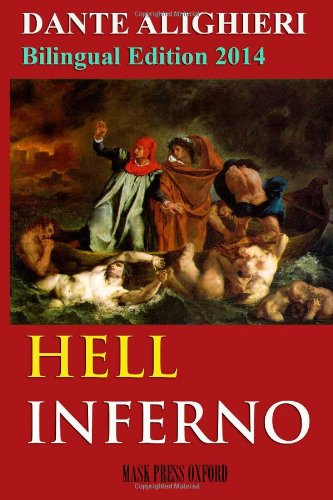
Synopsis
NEW BILINGUAL EDITION 2014 - Italian / English - of the poetry masterpiece 'Hell', 'Inferno' ('Divine Comedy', Book I) by the Italian poet of the Middle Ages, Dante Alighieri. Inferno / Hell is here republished both in the original language of the Middle Ages and in the classic translation into English by Rev. H. F. Cary. The volume includes a long essay by Italian critic, Francesco De Sanctis (pages 328) 'Mask Press Oxford ' Bilingual Edition - Italian / English, 2014 THE ORIGINAL MASTERPIECE Inferno (Hell ) is the first part of Dante Alighieri's 14th-century poem Divine Comedy. It tells the jouney of Dante through Hell, guided by the Roman poet Virgil. Dante's Hell has nine circles of suffering located within the Earth. Allegorically, the Divine Comedy represents the journey of the soul towards God, with the Inferno describing the worse human sins. Review: "Una traduzione classica, ineccepibile, che certamente aiuterà il lettore contemporaneo di lingua inglese a carpire le risonanze del testo italiano del Trecento, scritto da Dante in una lingua viva e immersa nell'attualità politica, culturale e sociale della sua epoca. Tutti dovrebbero avere nella loro libreria una copia dell'Inferno di Dante: insegna così tanto sulla natura umana e delle relazioni spesso corrotte e disastrose del nostro mondo. "
"synopsis" may belong to another edition of this title.
About the Author
Dante Alighieri was a major Italian poet of the Middle Ages. His Divine Comedy, originally called Comedìa and later called Divina by Boccaccio, is widely considered the greatest literary work composed in the Italian language and a masterpiece of world literature. In Italy he is known as il Sommo Poeta ("the Supreme Poet") or just il Poeta. He, Petrarch and Boccaccio are also known as "the three fountains" or "the three crowns". Dante is also called "the Father of the Italian language". Bio from Britannica: Dante’s Divine Comedy, a great work of medieval literature, is a profound Christian vision of man’s temporal and eternal destiny. On its most personal level, it draws on the poet’s own experience of exile from his native city of Florence; on its most comprehensive level, it may be read as an allegory, taking the form of a journey through hell, purgatory, and paradise. The poem amazes by its array of learning, its penetrating and comprehensive analysis of contemporary problems, and its inventiveness of language and imagery. By choosing to write his poem in Italian rather than in Latin, Dante decisively influenced the course of literary development. Not only did he lend a voice to the emerging lay culture of his own country, but Italian became the literary language in western Europe for several centuries. In addition to poetry Dante wrote important theoretical works ranging from discussions of rhetoric to moral philosophy and political thought. He was fully conversant with the classical tradition, drawing for his own purposes on such writers as Virgil, Cicero, and Boethius. But, most unusual for a layman, he also had an impressive command of the most recent scholastic philosophy and of theology. His learning and his personal involvement in the heated political controversies of his age led him to the composition of De monarchia, one of the major tracts of medieval political philosophy.
"About this title" may belong to another edition of this title.